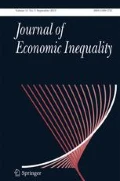Abstract
Wealthy individuals often voluntarily provide public goods that the poor also consume. We show that, rather than reducing it, such philanthropy may aggravate absolute inequality in welfare achievement, while leaving the change in relative inequality ambiguous. Additionally, philanthropic preferences may increase the effectiveness of policies to redistribute income, instead of weakening them. Our results thus suggest that philanthropy and direct redistribution may often be better viewed as complements, rather than substitutes, in the context of inequality reduction. In so doing, they also bring into question the general normative case for large tax deductions for charitable contributions.
Similar content being viewed by others
References
Andreoni, J.: Impure altruism and donations to public goods: a theory of warm-glow giving. Econ. J. 100, 464–477 (1990)
Andreoni, J., Payne, A.: Do government grants to private charities crowd out giving or fund-raising? Am. Econ. Rev. 93, 792–812 (2003)
Bergstrom, T., Blume, L., Varian, H.: On the private provision of public goods. J. Public Econ. 29, 25–49 (1986)
Blumkin, T., Sadka, E.: A case for taxing charitable contributions. J. Public Econ. 91, 1555–1564 (2007a)
Blumkin, T., Sadka, E.: On the desirability of taxing charitable contributions. CESifo Working Paper 1900 (2007b)
Boadway, R., Marchand, M.: The use of public expenditures for redistributive purposes. Oxf. Econ. Pap. 47, 45–59 (1995)
Bossert, W., Pfingsten, A.: Intermediate inequality: concepts, indices and welfare implications. Math. Soc. Sci. 19, 117–134 (1990)
Breunig, R., Dasgupta, I.: Do intra-household effects explain the food stamp cash-out puzzle? Am. J. Agric. Econ. 87, 552–568 (2005)
Chakravarty, S., Tyagarupananda, S.: The subgroup decomposable absolute indices of inequality. In: Chakravarty, S.R., Coondoo, D., Mukherjee, R. (eds.) Quantitative Economics: Theory and Practice. Allied, New Delhi (1998)
Cornes, R.: Measuring the distributional impact of public goods. In: Van de Walle, D., Nead, K. (eds.) Public Spending and the Poor: Theory and Evidence. Johns Hopkins University Press/World Bank, Washington (1996)
Cornes, R., Sandler, T.: The comparative static properties of the impure public good model. J. Public Econ. 54, 403–421 (1994)
Cornes, R., Sandler, T.: The Theory of Externalities, Public Goods and Club Goods, 2nd edn. Cambridge University Press, Cambridge (1996)
Cornes, R., Sandler, T.: Pareto-improving redistribution and pure public goods. Ger. Econ. Rev. 1, 169–186 (2000)
D’Arcy, D.: Artful Dodgers. www.forbes.com/2002/07/03/0703hot.html (2002)
Dasgupta, I.: Why praise inequality? Public good provision, income distribution and social welfare. Discussion Paper 08/07, School of Economics, University of Nottingham (2008)
Dasgupta, I.: ‘Living’ wage, class conflict and ethnic strife. J. Econ. Behav. Organ 72, 750–765 (2009)
Dasgupta, I., Kanbur, R.: Bridging communal divides: separation, patronage, integration. In: Barrett, C. (ed.) The Social Economics of Poverty: On Identities, Groups, Communities and Networks. Routledge, London (2005a)
Dasgupta, I., Kanbur, R.: Community and anti-poverty targeting. J. Econ. Inequal. 3, 281–302 (2005b)
Dasgupta, I., Kanbur, R.: Community and class antagonism. J. Public Econ. 91, 1816–1842 (2007)
Diamond, P.: Optimal tax treatment of private contributions for public goods with and without warm glow preferences. J. Public Econ. 90, 897–919 (2006)
Hrywna, M.: Obama’s budget would cut charitable deduction. The NonProfit Times February 27; www.nptimes.com/09Feb/npt-022709-1.html (2009)
Itaya, J., de Meza, D., Myles, G.: In praise of inequality: public good provision and income distribution. Econ. Lett. 57, 289–296 (1997)
Kolm, S.: Unequal inequalities I. J. Econ. Theory 12, 416–442 (1976)
Kolm, S.: Unequal inequalities II. J. Econ. Theory 13, 82–111 (1976)
Leigh, G.: Small Matters of Life and Death. The Guardian, London (2006)
Scruton, R.: The Meaning of Conservatism, 3rd edn. Palgrave, Houndmills (2001)
Zheng, B.: Unit-consistent decomposable inequality measures. Economica 74, 97–111 (2007)
Author information
Authors and Affiliations
Corresponding author
Additional information
We thank two anonymous referees for many useful comments. We have also benefited from helpful discussions with Richard Cornes, Amrita Dhillon, Prasanta Pattanaik and seminar audiences at Brunel, Delhi School of Economics, Indian Statistical Institute and Jadavpur University. Financial support from The Pew Charitable Trusts is gratefully acknowledged.
Rights and permissions
About this article
Cite this article
Dasgupta, I., Kanbur, R. Does philanthropy reduce inequality?. J Econ Inequal 9, 1–21 (2011). https://doi.org/10.1007/s10888-009-9123-6
Received:
Accepted:
Published:
Issue Date:
DOI: https://doi.org/10.1007/s10888-009-9123-6




